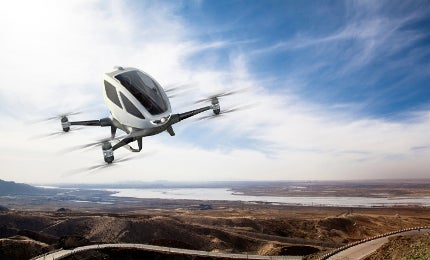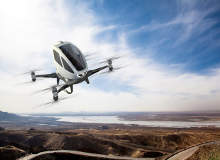
Iran to buy 118 Airbus aircraft worth $25bn
Iran Air signed an agreement worth $25bn to buy 118 aircraft from Airbus, marking the country’s return to the international civil aviation community.
The deal includes 21 A320ceo Family and 24 A320neo Family jetliners, 27 from the A330ceo Family, 18 A330-900neo aircraft, 16 A350-1000s and 12 A380s.
It also covers the training of pilots, customer support and services. Iran Air will also benefit from the advantages of Airbus’ product line commonality.
Canadian engineer unveils design concept for new Antipode hypersonic jet plane
A Canadian engineer unveiled a design concept for a new Antipode hypersonic jet plane that can fly from New York to London in 11 minutes.
Antipode can carry ten people at a time and fly up to 20,000km per hour.
The new jet concept follows engineer Charles Bombardier’s earlier hypersonic jet concept, the Skreemr, which is capable of carrying 75 passengers, to reach the speed of Mach 10.
How well do you really know your competitors?
Access the most comprehensive Company Profiles on the market, powered by GlobalData. Save hours of research. Gain competitive edge.

Thank you!
Your download email will arrive shortly
Not ready to buy yet? Download a free sample
We are confident about the unique quality of our Company Profiles. However, we want you to make the most beneficial decision for your business, so we offer a free sample that you can download by submitting the below form
By GlobalDataISS grows first flower in space
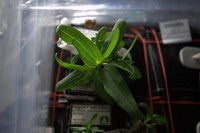
US astronaut Scott Kelly announced that crew members at the International Space Station (ISS) have grown a zinnia flower.
The announcement was made through Kelly’s Twitter account.
The orange coloured, 13-petal flower is the first plant grown at the ISS. The achievement has given scientists on Earth the opportunity to better understand the process of growing plants in microgravity.
Russian engineer unveils detachable cabin concept to save lives in plane crash
Russian aviation engineer Vladimir Tatarenko developed the concept of a detachable cabin for aircraft that could save lives in a crash.
After spending three years on the project, Tatarenko recently released a video, showcasing how the technology works during an emergency situation.
The prototype of the new cabin concept has a detachable cabin, which can be ejected at any time during takeoff, mid-air or landing and facilitate a safe landing for passengers.
Ehang develops human-carrying drone prototype
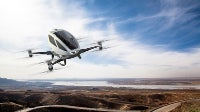
China-based drone maker Ehang developed an autonomous drone prototype, Ehang 184, that can carry humans.
The human-sized drone was displayed at CES 2016 in Las Vegas. Ehang 184 is equipped with eight propellers and four arms. It can carry one person.
The prototype looks similar to a helicopter. By pressing two buttons, take off and land, the flier can reach his destination. The autonomous aerial vehicle (AAV) can be used in shipping, medical care and retail, as well as other sectors in the transportation industry.
Airbus and OneWeb form joint venture to build 900 satellites
Airbus Defence and Space and OneWeb formed a joint venture, OneWeb Satellites, to develop 900 satellites that will offer high-speed internet globally.
The OneWeb constellation of low Earth orbit satellites is intended to provide connectivity to remote areas worldwide, with more than ten terabits per second of new capacity by 2019.
OneWeb Satellites, equally owned by Airbus and OneWeb, will also build satellites, platforms and equipment for other operators. The equipment will be marketed by Airbus.
Researchers find Beetle-inspired technology to prevent frost on aircraft surfaces
Virginia Tech researchers found new technology to prevent frost on aircraft surfaces, inspired by the Namib Desert Beetle.
The new solution uses chemical micro patterns to control the growth of frost caused by condensation.
Researchers used photolithography to pattern chemical arrays that attract water over the top of a surface that repels water, which controlled the spread of frost.
Nasa selects Orbital ATK, Sierra Nevada and SpaceX to deliver cargo to ISS
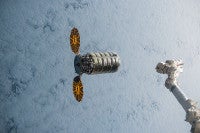
Nasa selected Orbital ATK, SpaceX and Sierra Nevada to deliver cargo to the International Space Station (ISS).
Under commercial resupply service (CRS-2) contracts, the companies will deliver critical science, research and technology equipment to ISS from 2019 to 2024.
Under the contract, companies will also be responsible for bringing back surplus cargo, research samples and other cargo from the ISS back to Earth.
Boeing to reduce 747-8 production after low market demand
Boeing announced it will reduce the production rate of its 747-8 in order to align supply with near-term demand in the cargo market.
The reduction is the fourth for the company in less than two years.
Boeing Commercial Airplanes CEO Ray Conner said: "Global air passenger traffic growth and airplane demand remain strong, but the air cargo market recovery that began in late 2013 has stalled in recent months and slowed demand for the 747-8 freighter."
Nanosatellites demonstrate world’s first autonomous orbit change
A pair of nanosatellites completed the world’s first demonstration of autonomous spacecraft-to-spacecraft orbit manoeuvring.
The Space Flight Laboratory at the University of Toronto Institute for Aerospace Studies (UTIAS) and asteroid mining company Deep Space Industries (DSI) collaborated for the first time to undertake the experiment.
SFL contributed its nanosatellites CanX-4 and CanX-5 to execute the mission, which involved CanX-4 autonomously programming CanX-5 to perform an orbit change.

